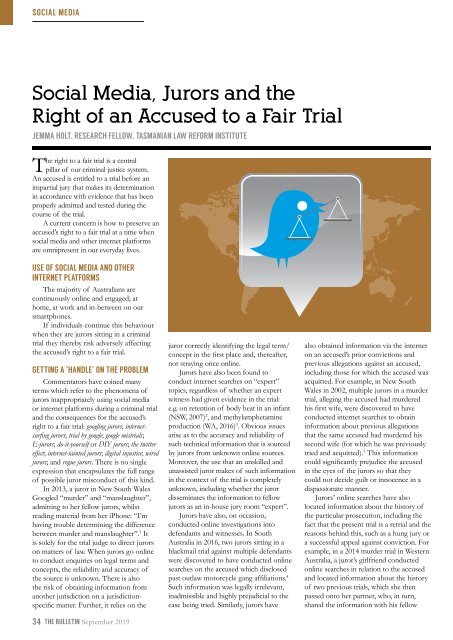LSB September 2019_Web
You also want an ePaper? Increase the reach of your titles
YUMPU automatically turns print PDFs into web optimized ePapers that Google loves.
SOCIAL MEDIA<br />
Social Media, Jurors and the<br />
Right of an Accused to a Fair Trial<br />
JEMMA HOLT, RESEARCH FELLOW, TASMANIAN LAW REFORM INSTITUTE<br />
The right to a fair trial is a central<br />
pillar of our criminal justice system.<br />
An accused is entitled to a trial before an<br />
impartial jury that makes its determination<br />
in accordance with evidence that has been<br />
properly admitted and tested during the<br />
course of the trial.<br />
A current concern is how to preserve an<br />
accused’s right to a fair trial at a time when<br />
social media and other internet platforms<br />
are omnipresent in our everyday lives.<br />
USE OF SOCIAL MEDIA AND OTHER<br />
INTERNET PLATFORMS<br />
The majority of Australians are<br />
continuously online and engaged; at<br />
home, at work and in-between on our<br />
smartphones.<br />
If individuals continue this behaviour<br />
when they are jurors sitting in a criminal<br />
trial they thereby risk adversely affecting<br />
the accused’s right to a fair trial.<br />
GETTING A ‘HANDLE’ ON THE PROBLEM<br />
Commentators have coined many<br />
terms which refer to the phenomena of<br />
jurors inappropriately using social media<br />
or internet platforms during a criminal trial<br />
and the consequences for the accused’s<br />
right to a fair trial: googling jurors; internetsurfing<br />
jurors; trial by google; google mistrials;<br />
E-jurors; do-it-yourself or DIY jurors; the twitter<br />
effect; internet-tainted jurors; digital injustice; wired<br />
jurors; and rogue jurors. There is no single<br />
expression that encapsulates the full range<br />
of possible juror misconduct of this kind.<br />
In 2013, a juror in New South Wales<br />
Googled “murder” and “manslaughter”,<br />
admitting to her fellow jurors, whilst<br />
reading material from her iPhone: “I’m<br />
having trouble determining the difference<br />
between murder and manslaughter”. 1 It<br />
is solely for the trial judge to direct jurors<br />
on matters of law. When jurors go online<br />
to conduct enquiries on legal terms and<br />
concepts, the reliability and accuracy of<br />
the source is unknown. There is also<br />
the risk of obtaining information from<br />
another jurisdiction on a jurisdictionspecific<br />
matter. Further, it relies on the<br />
34 THE BULLETIN <strong>September</strong> <strong>2019</strong><br />
juror correctly identifying the legal term/<br />
concept in the first place and, thereafter,<br />
not straying once online.<br />
Jurors have also been found to<br />
conduct internet searches on “expert”<br />
topics, regardless of whether an expert<br />
witness had given evidence in the trial:<br />
e.g. on retention of body heat in an infant<br />
(NSW, 2007) 2 , and methylamphetamine<br />
production (WA, 2016) 3 . Obvious issues<br />
arise as to the accuracy and reliability of<br />
such technical information that is sourced<br />
by jurors from unknown online sources.<br />
Moreover, the use that an unskilled and<br />
unassisted juror makes of such information<br />
in the context of the trial is completely<br />
unknown, including whether the juror<br />
disseminates the information to fellow<br />
jurors as an in-house jury room “expert”.<br />
Jurors have also, on occasion,<br />
conducted online investigations into<br />
defendants and witnesses. In South<br />
Australia in 2016, two jurors sitting in a<br />
blackmail trial against multiple defendants<br />
were discovered to have conducted online<br />
searches on the accused which disclosed<br />
past outlaw motorcycle gang affiliations. 4<br />
Such information was legally irrelevant,<br />
inadmissible and highly prejudicial to the<br />
case being tried. Similarly, jurors have<br />
also obtained information via the internet<br />
on an accused’s prior convictions and<br />
previous allegations against an accused,<br />
including those for which the accused was<br />
acquitted. For example, in New South<br />
Wales in 2002, multiple jurors in a murder<br />
trial, alleging the accused had murdered<br />
his first wife, were discovered to have<br />
conducted internet searches to obtain<br />
information about previous allegations<br />
that the same accused had murdered his<br />
second wife (for which he was previously<br />
tried and acquitted). 5 This information<br />
could significantly prejudice the accused<br />
in the eyes of the jurors so that they<br />
could not decide guilt or innocence in a<br />
dispassionate manner.<br />
Jurors’ online searches have also<br />
located information about the history of<br />
the particular prosecution, including the<br />
fact that the present trial is a retrial and the<br />
reasons behind this, such as a hung jury or<br />
a successful appeal against conviction. For<br />
example, in a 2014 murder trial in Western<br />
Australia, a juror’s girlfriend conducted<br />
online searches in relation to the accused<br />
and located information about the history<br />
of two previous trials, which she then<br />
passed onto her partner, who, in turn,<br />
shared the information with his fellow


















